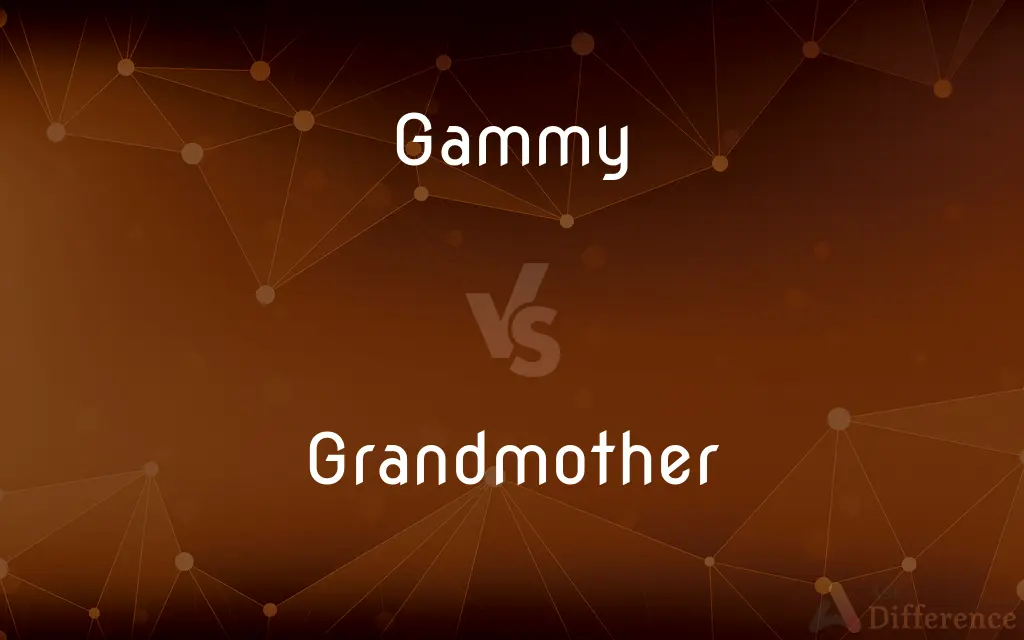Gammy vs. Grandmother — What's the Difference?
By Fiza Rafique & Maham Liaqat — Updated on April 25, 2024
"Gammy" is a casual, affectionate term for grandmother, often used within families, whereas "grandmother" is the formal term for a mother's or father's mother.

Difference Between Gammy and Grandmother
Table of Contents
ADVERTISEMENT
Key Differences
"Gammy" often evokes a sense of warmth and closeness within a family, reflecting a more intimate bond. On the other hand, "grandmother" carries a more formal and respectful tone, used in both personal and formal contexts.
Children might find "gammy" easier and more endearing to say due to its simplicity and phonetic friendliness. Conversely, "grandmother" is more universally recognized and understood in diverse cultural and social settings.
"Gammy" can vary in usage and popularity depending on regional and family traditions, whereas "grandmother" is standard and consistent across English-speaking regions.
Usage of "gammy" can indicate a family’s unique linguistic habits or endearments. In contrast, "grandmother" is used in official documents and when referring to ancestry or family lineage more formally.
The choice between "gammy" and "grandmother" can reflect the formality of the situation or the speaker’s relationship to the person; "gammy" is informal, while "grandmother" is decidedly formal.
ADVERTISEMENT
Comparison Chart
Formality
Informal
Formal
Usage Context
Family, casual
All contexts, including legal
Emotional Connotation
Affectionate, warm
Respectful, distant
Phonetic Complexity
Simple, easy to pronounce
More complex, formal
Recognition
Less universally known
Widely recognized
Compare with Definitions
Gammy
A familiar or affectionate term for a grandmother.
I’m spending the weekend at Gammy’s house.
Grandmother
Recognized and respected across various cultures.
My grandmother holds a central role in our family gatherings.
Gammy
Can vary by region or family tradition.
In our family, we say Gammy instead of grandma.
Grandmother
The formal term for the mother of one's parent.
My grandmother immigrated here in the 1940s.
Gammy
Used predominantly in private or family discourse.
Gammy makes the best cookies.
Grandmother
Commonly appears in legal and genealogical documents.
Her name is listed as the grandmother in the family tree.
Gammy
Often adopted by younger children for ease of pronunciation.
My little cousin calls our grandmother Gammy.
Grandmother
Used in both personal and formal communications.
We visited my grandmother over the holidays.
Gammy
Reflects a casual, intimate family relationship.
Gammy and I have a special nickname for each other.
Grandmother
Associated with wisdom and tradition.
My grandmother taught me how to knit.
Gammy
Injured, or not functioning properly (with respect to legs).
I have got a gammy leg, and can't walk far.
Grandmother
The mother of one's father or mother
Grandmother Asha
To dearest Grandmother, with love and gratitude
My grandmother is ill
Gammy
(colloquial) Grandmother.
Had our beloved gammy lost it?
Grandmother
The mother of one's father or mother.
Gammy
A blowjob; fellatio.
Grandmother
A female ancestor.
Gammy
(British informal) sore or lame;
A gammy foot
Grandmother
A mother of someone's parent.
Grandmother
A female ancestor or progenitor.
Grandmother
The mother of one's father or mother.
Grandmother
The mother of your father or mother
Common Curiosities
What is the difference between 'gammy' and 'grandmother'?
'Gammy' is a casual nickname for grandmother, whereas 'grandmother' is the formal term.
Is 'gammy' recognized officially?
No, 'gammy' is considered informal and is not used in official contexts.
What are the emotional connotations of 'gammy' versus 'grandmother'?
'Gammy' is often seen as more affectionate, whereas 'grandmother' can seem more formal and respectful.
Why do some children use 'gammy' instead of 'grandmother'?
'Gammy' is often easier for young children to pronounce and feels more affectionate.
Can the term 'gammy' evolve in its usage?
Yes, like many familial nicknames, 'gammy' can evolve in how and where it is used within families.
Does 'gammy' have different meanings in different cultures?
While the affectionate intent is generally consistent, the actual use of 'gammy' can vary by family and region.
Can 'gammy' be used in documents?
It is not appropriate to use 'gammy' in formal documents; 'grandmother' should be used instead.
Is 'gammy' a universal term?
No, 'gammy' is not as universally recognized as 'grandmother'.
How does the use of 'gammy' affect family dynamics?
Using 'gammy' can signify a closer, more informal relationship within the family.
Do any legal systems recognize 'gammy' as a term for grandmother?
Legal systems do not typically recognize 'gammy' as they do 'grandmother'.
Are there any formal occasions where 'gammy' would be inappropriate?
Yes, in formal or unfamiliar settings, it's more appropriate to use 'grandmother'.
Does the term 'gammy' appear in literature?
'Gammy' is less common in literature compared to the widely used 'grandmother'.
How does the complexity of pronunciation affect the choice between 'gammy' and 'grandmother'?
Simpler pronunciation makes 'gammy' more appealing to young children.
What can someone learn about family relationships from the terms 'gammy' and 'grandmother'?
These terms can reflect the formality, intimacy, and cultural background of family relationships.
Share Your Discovery

Previous Comparison
Japan vs. China
Next Comparison
Amount vs. VolumeAuthor Spotlight
Written by
Fiza RafiqueFiza Rafique is a skilled content writer at AskDifference.com, where she meticulously refines and enhances written pieces. Drawing from her vast editorial expertise, Fiza ensures clarity, accuracy, and precision in every article. Passionate about language, she continually seeks to elevate the quality of content for readers worldwide.
Co-written by
Maham Liaqat















































